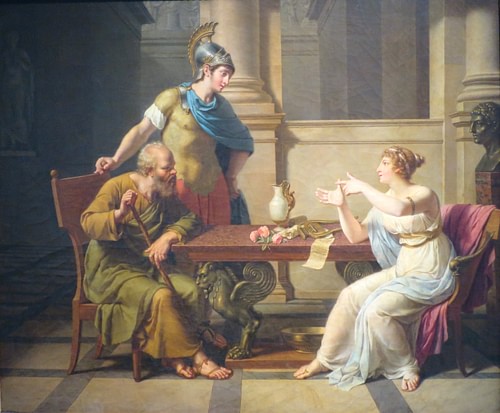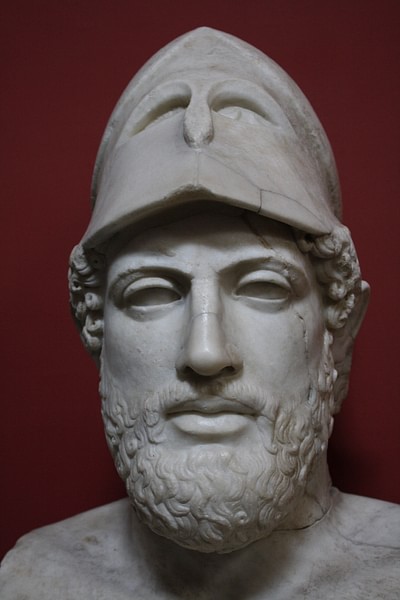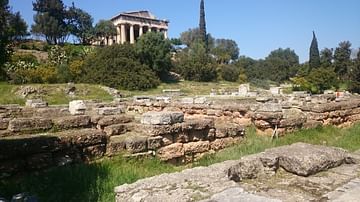
Aspasia of Miletus (l. c. 470-410/400 BCE) is best known as the consort of the great Athenian statesman Pericles. Her life story has always been given in the shadow of Pericles' fame, but she was a woman of great eloquence and intelligence in her own right who influenced many of the writers, thinkers, and statesmen of her time.
She was a metic (a person not born in Athens) and, accordingly, was not allowed to marry an Athenian and had to pay a tax to live in Athens, but it is most likely because of her foreign status that she was not constrained by Athenian policies regarding women's behavior. She bore Pericles (l. 495-429 BCE) a son (Pericles the Younger, l. c. 440-406 BCE) out of wedlock, taught men and women, and seems to have lived freely however she pleased.
This much is known as well as that she lived, wrote, and worked in Athens c. 450 - c. 428 BCE and operated a salon of some sort, but little else can be said for certain. It is not even known if Aspasia (pronounced Ahs-pah-SEE-uh) was her actual name or a "professional name" as she was famous as a hetaira (a high-class courtesan), and her name means "greeting with affection" or "welcome" or "desired one" according to various translations. Scholars almost universally agree that Aspasia was not the woman's birth name.
Ancient writers from Aristophanes (l. c. 460 - c. 380 BCE) to Plato (l. 424/423-348/347 BCE) to Plutarch (l. c. 45/50 - c. 120/125 CE) reference her eloquence and power in controlling men, and this established her reputation as none of her own works, if she actually wrote any, have survived. In the 19th and 20th centuries, mainly owing to the literary works of Walter Savage Landor (l. 1775-1864) and Gertrude Atherton (l. 1857-1948), respectively, Aspasia came to be viewed as a romantic heroine of the Golden Age of Athens and she and Pericles as exemplifying the romantic couple.
She is recognized as an important figure today as she defied the restrictive policies of Athenian society regarding women (who were seen as second-class citizens) to live her life according to her own vision. In the modern era, she is understood as an intellectual and teacher of enormous ability whose influence on famous male writers and thinkers of her day was significant.
Ancient & Modern Depictions
Whoever Aspasia was, it seems clear she was a woman of impressive accomplishments; even if it remains unclear precisely what those accomplishments were. Although ancient writers allude to her influence over others (such as Socrates, for example), few details are given as to what aspects of others' works should be credited to her.
The claim that she wrote Pericles' famous Funeral Oration cannot be substantiated and, in fact, was originally made as a slur. She vanished from the history of rhetoric for this very reason: the inability of later scholars to identify her with any given extant works.
It has been noted by scholar Madeleine M. Henry that Aspasia is depicted by ancient writers according to those writers' individual biases and so a clear picture of who she was and what she accomplished is almost impossible to grasp. Henry comments:
When we need Aspasia to be a chaste muse and teacher, she is there; when we need a grand horizontal, she is there, when we need a proto feminist, she is there also. (128)
Ancient writers from Plato to Plutarch have characterized her according to their own particular need, and so a modern reader must sift and measure the various accounts in an attempt to come to terms with who Aspasia may have been. A standard depiction of her in modern times reads:
A contributor to learning in Athens, Aspasia of Miletus (c. 470-401/400 BCE) boldly surpassed the limited expectations for women by establishing a renowned girl's school and a popular salon. She lived free of female seclusion and conducted herself like a male intellectual while expounding on current events, philosophy, and rhetoric. Her fans included the philosopher Socrates and his followers, the teacher Plato, the orator Cicero, the historian Xenophon, the writer Athenaeus, and the statesman and general Pericles, her adoring common-law husband (The Oxford Classical Dictionary, 1992).
Ancient depictions, however, vary from Aristophanes' comical charge in his Acharnians that Aspasia started the Peloponnesian War over the abduction of "two whores" of hers to Plato's image of her in his Menexenus where she is Socrates' teacher in rhetoric. It should be noted that the Menexenus is a satirical dialogue and when the character of Menexenus says, "I marvel that Aspasia, who is only a woman, should be able to compose such a speech," Plato is most certainly writing tongue in cheek (Menexenus, 235e).
While Aspasia herself wrote nothing extant, her influence is thought to be apparent in the works of her contemporaries and later writers, but this claim is based on circumstantial evidence since, as noted, it is unclear what works she may have actually contributed to. Scholar Joyce E. Salisbury provides the scenario others point to in claiming Aspasia's influence:
Aspasia's house quickly became the fashionable place for gentlemen of quality to gather. Politicians, playwrights, philosophers, artists, and literary celebrities passed through her doors, and she came to know the most famous architects of the Athenian golden age. (23)
Scholar I. M. Plant contributes to this claim while qualifying how much remains unknown of Aspasia's life and work:
Aspasia is one of the most famous women of classical Greece, yet little is known of her life, and most of what was written about her in her own day is dubious. As the partner of Pericles, Athens' leading statesman in the mid-fifth century BC, Aspasia moved in the highest aristocratic circles and attracted the attention of comic and serious writers. She inspired literary personae which in turn led to the creation of pseudonymous works in her name. (41)
None of these pseudonymous works have survived but are referenced by other writers who either praise or blame Aspasia for her influence over powerful men. Plutarch consistently praises the accomplishments of Pericles and blames any of his mistakes on Aspasia. At one point, in his Life of Pericles, Plutarch seems to wonder aloud:
What great art or power this woman had, that she managed as she pleased the foremost men of the state and afforded the philosophers occasion to discuss her in exalted terms and at great length. (24.1)
Plutarch's question seems to have been asked by many of Aspasia's contemporaries and those who followed after. The philosopher Aeschines of Sphettus (l. c. 425 - c. 350 BCE) seems to answer this by presenting her as a clever speaker and an intellectual of note who made a lasting impression on those who heard her speak. Like Plato, Aeschines of Sphettus wrote philosophical dialogues, including an Aspasia, but these have been lost. All we know of his thoughts on Aspasia come from later writers who have also provided the few details of her life.
Life of Aspasia
Aspasia was born sometime between 470 and 460 BCE to a wealthy family of Miletus. This is assumed because of references to her high level of education, which suggests Miletus as her hometown, where, unlike in Athens, women of means could receive higher education. It is unclear when she came to Athens or why, although it has been suggested she was the younger sister of the wife of the elder Alcibiades (grandfather of the famous general and statesman Alcibiades, l. c. 451 - c. 403 BCE) who had been exiled, lived in Miletus, and then returned to Athens with his wife and her younger sister at some point. However and whenever she arrived, she operated a salon (which her critics called a 'brothel') and a girl's school that was also cited by her detractors as either a brothel or a house in which she secured young girls for upper-class men's pleasure and trained them as courtesans. This could be true as such houses did exist and were considered legitimate businesses and options for women in Ancient Greece.
She met Pericles sometime around c. 450 BCE and was his almost constant companion, after he divorced his wife, by c. 445 BCE. Enemies of Pericles made much of his relationship with Aspasia the metic and hetaira even going so far as to claim that Aspasia "taught Pericles how to speak" and was the actual author of his famous Funeral Oration. While this charge is not something which would trouble most men of the modern era, in ancient Greece it would have been a grave insult; no Athenian statesman, nor any man in general, would wish it known that he was indebted to a woman for his success.
Socrates, however, who seems to have generally held women in higher regard than most men in ancient Athens, is said to have "marveled at her eloquence, and credited her with composing the famous funeral oration that Pericles delivered in honor of the casualties of the Peloponnesian War and, further, claimed that he, Socrates, had learned from Aspasia the art of eloquence" (Durant, 253). This claim is also made in Plato's dialogue Menexenus, (235e) where Aspasia is Socrates' teacher, not only in eloquence but the art of dialectic.
Even so, the conservative enemies of Pericles kept up their attacks on Aspasia and, through her, on Pericles, claiming that she showed disrespect for the gods, and going so far as to bring a charge of impiety against her. Historian Will Durant comments:
At her trial, which took place before a court of fifteen hundred jurors, Pericles spoke in her defense, using all his eloquence, even to tears; and the case was dismissed. (254)
Although she was exonerated, Durant goes on to point out that, after his performance in court on Aspasia's behalf, Pericles "began to lose his hold upon the Athenian people and when, three years later, death came to him, he was already a broken man" (254). Whether this was a direct result of the court case, however, is unclear.
After Pericles' death in 429 BCE from the plague at Athens, 430-427 BCE, Aspasia became the companion of his friend Lysicles (d. 428 BCE), whom she first knew as an uneducated sheep merchant. Prior to Pericles' death, Aspasia had helped transform Lysicles into an Athenian political leader and general. Lysicles was killed in action in the Peloponnesian War's campaign in Caria of 428/427 BCE, and nothing else is known of Aspasia after that with any certainty, not even the exact year of her death.
Eloquence & Criticism
As noted, the great speeches given by Pericles have been attributed to Aspasia, and it has also been suggested that she modelled the argument of the Inductio (getting one's interlocutor to assent to a doubtful proposition that resembles an earlier one already agreed to) for Socrates and so taught him the stratagems of argument. An example of the Inductio is seen in the following fragment from the dialogue of Aeschines of Sphettus in which Aspasia uses it in conversation with Xenophon (l. 430 - c. 354 BCE, one of Socrates' students) and his wife. She uses the Inductio to show them that each should be the best spouse to the other instead of wishing for an ideal mate:
"Please tell me, wife of Xenophon, if your neighbor had a better gold ornament than you have, would you prefer that one or your own?"
"That one, " she replied.
"Now, if she had dresses and other feminine finery more expensive than you have, would you prefer yours or hers?"
"Hers, of course," she replied.
"Well now, if she had a better husband than you have, would you prefer your husband or hers?"
At this the woman blushed. But Aspasia then began to speak to Xenophon. "I wish you would tell me, Xenophon," she said, "if your neighbor had a better horse than yours, would you prefer your horse or his?"
"His" was his answer.
"And if he had a better farm than you have, which farm would your prefer to have?"
"The better farm, naturally," he said.
"Now if he had a better wife than you have, would you prefer yours or his?"
And at this Xenophon, too, himself was silent.
Then Aspasia: "Since both of you have failed to tell me the only thing I wished to hear, I myself will tell you what you both are thinking. That is, you, madam, wish to have the best husband, and you, Xenophon, desire above all things to have the finest wife. Therefore, unless you can contrive that there be no better man or finer woman on earth you will certainly always be in dire want of what you consider best, namely, that you be the husband of the very best of wives, and that she be wedded to the very best of men." (Henry, 44)
Aeschines (also a pupil of Socrates), as noted, wrote a dialogue Aspasia about her, which is now lost save for a few fragments which give evidence of a positive portrayal but Aristophanes, the Greek comedy poet, features her unfavorably in his work (as do many of his contemporaries) where he calls her friends “Aspasia's whores” and generally speaks ill of her (Baird & Kaufmann, 62).
Plutarch, as noted, claims Aspasia held undue influence over Pericles, seduced him into going to war, and was ultimately to blame for every mistake Pericles made. Even Plato, who writes favorably of her in his Menexenus, criticizes her in the same breath. Salisbury comments:
Some scholars argue that Plato recognized Aspasia's reputation as a philosopher/rhetorician but disapproved of the influence philosophers like her had on Greece. What was Aspasia's influence? It seems that Plato regarded her as representing the abuses of philosophy: of using wisdom and the truth in the form of her mastery of rhetoric to control and deceive the people. In a sense, he accused her of being a consummate politician. (23)
Later writers, however, such as the rhetorician Quintilian (l. 35-100 CE) held her in high regard as did the satirist Lucian (l. 125-180 CE), both of whom cited her as an eloquent and intelligent teacher. Lucian refers to her as a woman of wisdom and understanding while Quintilian thought enough of her influence to lecture about her to his classes.
Conclusion
In the present day, Aspasia's reputation continues to be regarded highly and has undergone a dramatic (and, initially, romantic) renaissance from the earlier criticism and then near-total obscurity. The author and poet Walter Savage Landor published his popular Pericles and Aspasia in 1836; a work of fictional letters between the two in which Pericles, tragically but erroneously, dies in the Peloponnesian War.
This work received wide acclaim which later inspired the author Gertrude Atherton (l. 1857-1948) to write and publish her equally popular novel The Immortal Marriage in 1927 CE, presenting a positive image of Aspasia as a strong and highly cultured woman who made Pericles the popular speaker and statesman he was. Atherton's book became a bestseller and impressed upon an entire generation the image of Pericles and Aspasia as the epitome of the classic romantic couple and Aspasia as a proto-feminist and independent woman.

Since Atherton's work, more scholars have been drawn to Aspasia and claim, with increasing certainty, her influence over the major writers and thinkers of her day. Madeline M. Henry, a leading scholar on the subject, notes that "Aspasia of Miletus, a key figure in the intellectual history of fifth-century Athens, is without question the most important woman of that era" and argues (as Durant and others claimed earlier) that Aspasia was Socrates' teacher (3).
It has even been claimed that Aspasia could be the model for the character Diotima from Mantinea, the woman who taught Socrates the meaning of love. In Plato's dialogue Symposium, in which Socrates delivers a speech on the true nature of Eros, he claims he was instructed in love by a woman who came to Athens "in the days before the plague" and who helped the Athenians in their sacrifices (Baird & Kaufmann, 195). Diotima is depicted as wise, eloquent, and a teacher of men, all characteristics associated with Aspasia.
Even if she is not the model for Diotima, simply the suggestion she could have been is evidence of Aspasia's growing reputation in the modern era. Whatever her contemporaries may have thought of a woman wielding influence over men, Aspasia's status seems secure today as a thinker, writer, and teacher of renown and the equal of any intellectual of her time.











